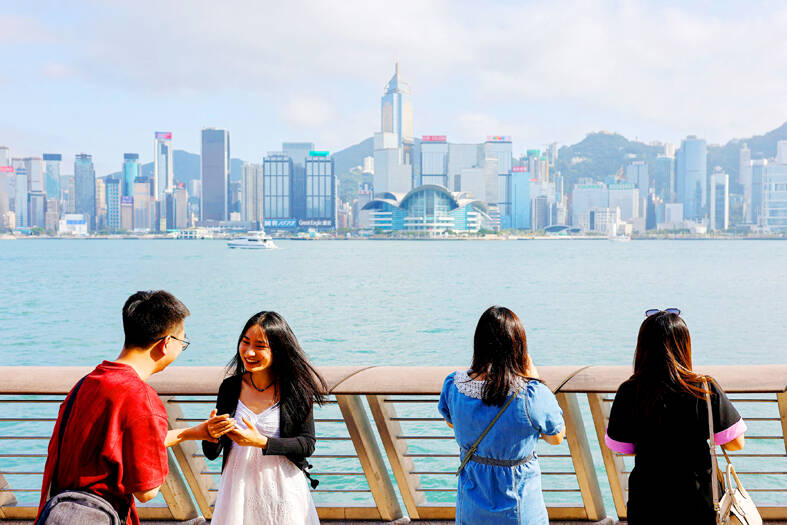US firms have warned that proposed cyberregulations could grant the Hong Kong government unusual access to their computer systems, highlighting the latest challenge to Western technology giants in the territory.
The Asia Internet Coalition, which includes Amazon.com Inc, Alphabet Inc’s Google and Meta Platforms Inc, is among the bodies that have criticized new rules that officials say are designed to protect critical infrastructure from cyberattacks.
The Hong Kong government said it aims to identify and designate specific organizations as critical infrastructure operators and ensure they take measures to safeguard their systems.

Photo: Reuters
Critics argue the proposals give authorities overly broad powers that could threaten the integrity of service providers and rock confidence in the territory’s digital economy.
The local American Chamber of Commerce (AmCham) and Hong Kong General Chamber of Commerce have also submitted letters over the proposed legislative framework to a public consultation.
Two of the three groups flagged the rules — which some were concerned could apply to computer systems outside Hong Kong — as “unprecedented.”
One of their key objections was to proposed investigative powers that would let authorities connect their equipment to critical computer systems owned by private firms, and install programs on them.
“Such unprecedented power directly intervenes in, and could have a significant impact on a CIO’s operation and could harm the users of the services,” AmCham wrote in an Aug. 1 letter, referring to critical infrastructure operators.
Such a move “is likely to have a chilling effect” on technology investment in Hong Kong, it added.
The government in a statement late on Tuesday said that its proposal “in no way involves the personal data and business information.”
Hong Kong would only seek a court warrant to connect to computer systems or install programs in certain circumstances if operators would not or could not respond to potential cyberincidents. The envisioned legislation would not have “extraterritorial effect” beyond its jurisdiction, the statement said.
Hong Kong officials have previously said that the cybersecurity bill is needed to protect the territory’s economy, public safety and national security. They propose establishing a new commissioner’s office to oversee the legislation’s implementation.
Many nations have laws to safeguard strategic infrastructure and access networks — for instance, US law enforcement and counterintelligence agencies can conduct wiretaps with court authorization — but it is rare for government agencies to try and gain access to private networks or information by directly installing software.
Under the proposed new cyberregulations, companies would need to secure their computer systems and disclose to the government serious breaches within two hours. Fines for offenses could range as high as HK$5 million (US$641,540) and would be determined by a court, the proposal says.
The legislation is likely to be submitted to the Hong Kong Legislative Council by the end of this year and enacted, legal observers say.
While Hong Kong has a legitimate need for new cybersecurity rules, companies would be worried about protecting user data, said George Chen (陳澍), cochair of digital practice at The Asia Group, a Washington-based business and policy consulting firm.
“International platforms, especially cloud service providers, are also naturally concerned about the enforcement,” Chen said.
The question will be “where to draw the line between protecting user data privacy and overall cybersecurity concerns,” he said.

Intel Corp chief executive officer Lip-Bu Tan (陳立武) is expected to meet with Taiwanese suppliers next month in conjunction with the opening of the Computex Taipei trade show, supply chain sources said on Monday. The visit, the first for Tan to Taiwan since assuming his new post last month, would be aimed at enhancing Intel’s ties with suppliers in Taiwan as he attempts to help turn around the struggling US chipmaker, the sources said. Tan is to hold a banquet to celebrate Intel’s 40-year presence in Taiwan before Computex opens on May 20 and invite dozens of Taiwanese suppliers to exchange views

Application-specific integrated circuit designer Faraday Technology Corp (智原) yesterday said that although revenue this quarter would decline 30 percent from last quarter, it retained its full-year forecast of revenue growth of 100 percent. The company attributed the quarterly drop to a slowdown in customers’ production of chips using Faraday’s advanced packaging technology. The company is still confident about its revenue growth this year, given its strong “design-win” — or the projects it won to help customers design their chips, Faraday president Steve Wang (王國雍) told an online earnings conference. “The design-win this year is better than we expected. We believe we will win

Chizuko Kimura has become the first female sushi chef in the world to win a Michelin star, fulfilling a promise she made to her dying husband to continue his legacy. The 54-year-old Japanese chef regained the Michelin star her late husband, Shunei Kimura, won three years ago for their Sushi Shunei restaurant in Paris. For Shunei Kimura, the star was a dream come true. However, the joy was short-lived. He died from cancer just three months later in June 2022. He was 65. The following year, the restaurant in the heart of Montmartre lost its star rating. Chizuko Kimura insisted that the new star is still down

While China’s leaders use their economic and political might to fight US President Donald Trump’s trade war “to the end,” its army of social media soldiers are embarking on a more humorous campaign online. Trump’s tariff blitz has seen Washington and Beijing impose eye-watering duties on imports from the other, fanning a standoff between the economic superpowers that has sparked global recession fears and sent markets into a tailspin. Trump says his policy is a response to years of being “ripped off” by other countries and aims to bring manufacturing to the US, forcing companies to employ US workers. However, China’s online warriors